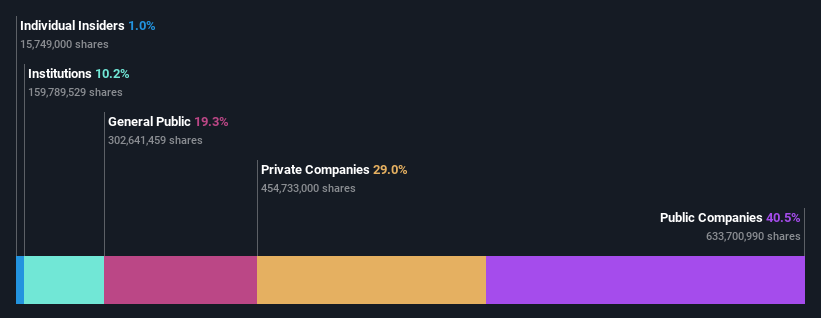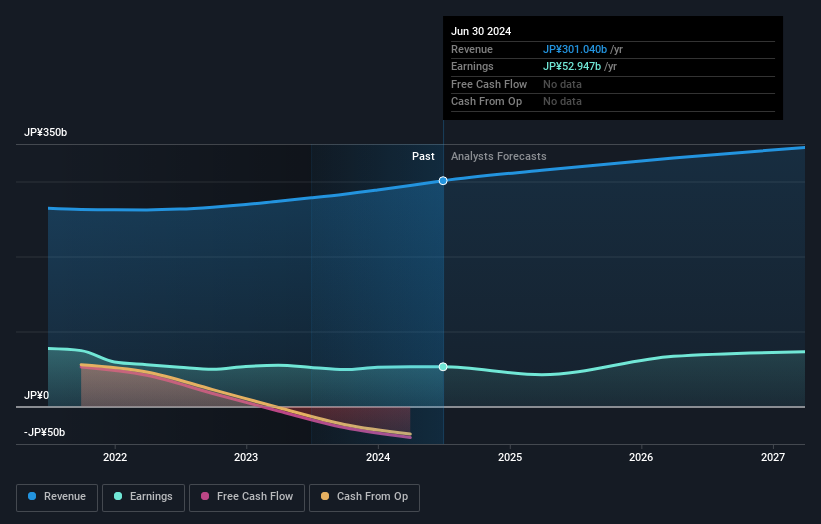- Japan
- /
- Consumer Finance
- /
- TSE:8572
Public companies account for 40% of Acom Co., Ltd.'s (TSE:8572) ownership, while private companies account for 29%

Key Insights
- Acom's significant public companies ownership suggests that the key decisions are influenced by shareholders from the larger public
- A total of 2 investors have a majority stake in the company with 58% ownership
- Institutions own 10% of Acom
To get a sense of who is truly in control of Acom Co., Ltd. (TSE:8572), it is important to understand the ownership structure of the business. We can see that public companies own the lion's share in the company with 40% ownership. In other words, the group stands to gain the most (or lose the most) from their investment into the company.
And private companies on the other hand have a 29% ownership in the company.
Let's take a closer look to see what the different types of shareholders can tell us about Acom.
Check out our latest analysis for Acom

What Does The Institutional Ownership Tell Us About Acom?
Institutions typically measure themselves against a benchmark when reporting to their own investors, so they often become more enthusiastic about a stock once it's included in a major index. We would expect most companies to have some institutions on the register, especially if they are growing.
We can see that Acom does have institutional investors; and they hold a good portion of the company's stock. This suggests some credibility amongst professional investors. But we can't rely on that fact alone since institutions make bad investments sometimes, just like everyone does. If multiple institutions change their view on a stock at the same time, you could see the share price drop fast. It's therefore worth looking at Acom's earnings history below. Of course, the future is what really matters.

Acom is not owned by hedge funds. Looking at our data, we can see that the largest shareholder is Mitsubishi UFJ Financial Group, Inc. with 40% of shares outstanding. Maruito Shokusan Co. Ltd. is the second largest shareholder owning 17% of common stock, and Maruito Co.,Ltd. holds about 8.0% of the company stock. In addition, we found that Masataka Kinoshita, the CEO has 0.8% of the shares allocated to their name.
To make our study more interesting, we found that the top 2 shareholders have a majority ownership in the company, meaning that they are powerful enough to influence the decisions of the company.
Researching institutional ownership is a good way to gauge and filter a stock's expected performance. The same can be achieved by studying analyst sentiments. There are a reasonable number of analysts covering the stock, so it might be useful to find out their aggregate view on the future.
Insider Ownership Of Acom
The definition of company insiders can be subjective and does vary between jurisdictions. Our data reflects individual insiders, capturing board members at the very least. The company management answer to the board and the latter should represent the interests of shareholders. Notably, sometimes top-level managers are on the board themselves.
Most consider insider ownership a positive because it can indicate the board is well aligned with other shareholders. However, on some occasions too much power is concentrated within this group.
We can see that insiders own shares in Acom Co., Ltd.. The insiders have a meaningful stake worth JP¥5.8b. Most would see this as a real positive. It is good to see this level of investment by insiders. You can check here to see if those insiders have been buying recently.
General Public Ownership
With a 19% ownership, the general public, mostly comprising of individual investors, have some degree of sway over Acom. This size of ownership, while considerable, may not be enough to change company policy if the decision is not in sync with other large shareholders.
Private Company Ownership
It seems that Private Companies own 29%, of the Acom stock. Private companies may be related parties. Sometimes insiders have an interest in a public company through a holding in a private company, rather than in their own capacity as an individual. While it's hard to draw any broad stroke conclusions, it is worth noting as an area for further research.
Public Company Ownership
It appears to us that public companies own 40% of Acom. We can't be certain but it is quite possible this is a strategic stake. The businesses may be similar, or work together.
Next Steps:
I find it very interesting to look at who exactly owns a company. But to truly gain insight, we need to consider other information, too. For instance, we've identified 2 warning signs for Acom (1 shouldn't be ignored) that you should be aware of.
If you would prefer discover what analysts are predicting in terms of future growth, do not miss this free report on analyst forecasts.
NB: Figures in this article are calculated using data from the last twelve months, which refer to the 12-month period ending on the last date of the month the financial statement is dated. This may not be consistent with full year annual report figures.
New: Manage All Your Stock Portfolios in One Place
We've created the ultimate portfolio companion for stock investors, and it's free.
• Connect an unlimited number of Portfolios and see your total in one currency
• Be alerted to new Warning Signs or Risks via email or mobile
• Track the Fair Value of your stocks
Have feedback on this article? Concerned about the content? Get in touch with us directly. Alternatively, email editorial-team (at) simplywallst.com.
This article by Simply Wall St is general in nature. We provide commentary based on historical data and analyst forecasts only using an unbiased methodology and our articles are not intended to be financial advice. It does not constitute a recommendation to buy or sell any stock, and does not take account of your objectives, or your financial situation. We aim to bring you long-term focused analysis driven by fundamental data. Note that our analysis may not factor in the latest price-sensitive company announcements or qualitative material. Simply Wall St has no position in any stocks mentioned.
About TSE:8572
Acom
Offers loans, credit cards, and loan guarantee services in Japan and internationally.
Undervalued with adequate balance sheet.
Market Insights
Community Narratives




